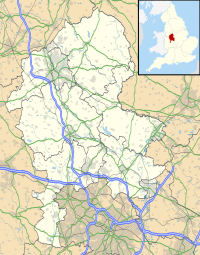Berryhill Fields is an area of grassland in the heart of Stoke-on-Trent in England, between the housing estates of Bentilee and Berryhill and the town of Fenton. It is a local nature reserve, owned and managed by Stoke-on-Trent City Council. Its area is 63.31 hectares (156.4 acres).[1]
| Berryhill Fields | |
|---|---|
 Breaking the Mould, sculpture by Andrew McKeown, installed in 2000. Commissioned by Groundwork UK. | |
| Location | Stoke-on-Trent |
| OS grid | SJ 908 458 |
| Coordinates | 53°00′33″N 2°08′25″W / 53.0092°N 2.1402°W |
| Area | 63.31 hectares (156.4 acres) |
| Operated by | Stoke-on-Trent City Council |
| Designation | Local nature reserve |
| Website | Berryhill Fields |
History
editThe earthwork remains of a medieval manor house (Lawn Farm moated site, a scheduled monument) are within the area. It is thought to have once been the manor house of Fenton Vivian (that later became the town of Fenton), named after Vivian of Standon, lord of the manor in the 13th century.[2][3]
In the first half of the 20th century there were two coal mines on the present Berryhill Fields, and small scale farming. The land was acquired for housing in the 1950s but no building took place. A subsequent plan for open-cast mining was turned down in 1994.[1]
Regeneration
editThe site was the subject of a £2 million regeneration project for the Millennium, managed by Groundwork Stoke, as part of the nationwide Changing Places programme, that included creating new pathways to facilitate access for people with disabilities, creating a number of art features, and funding a series of archaeological excavations on the site of the 13th-century moated manor house sited on the fields.
References
edit- ^ a b "Berryhill Fields" Natural England. Retrieved 11 July 2020.
- ^ 'Fenton', in A History of the County of Stafford: Volume 8, ed. J G Jenkins (London, 1963), pp. 205-224 British History Online. Retrieved 12 July 2020.
- ^ Historic England. "Lawn Farm moated site and two ponds (1011060)". National Heritage List for England. Retrieved 12 July 2020.
